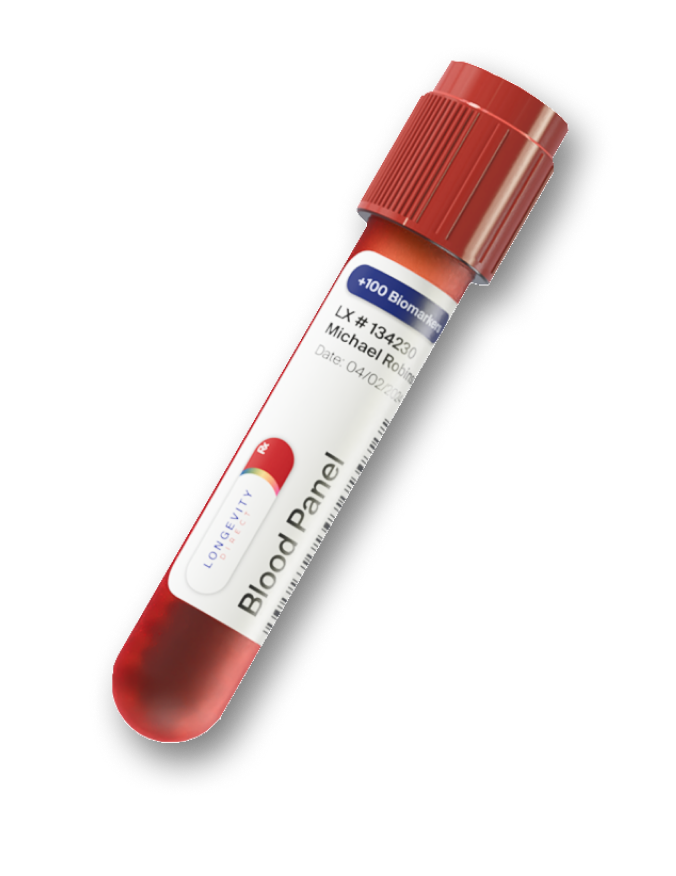Advanced Biomarker Testing
Comprehensive lab testing reveals the biological markers that matter most for longevity.
From inflammation and metabolic health to cellular aging, we measure what drives your healthspan.


Heart Health
Often called "bad cholesterol"; high levels can build up in artery walls and increase heart disease risk.
Known as "good cholesterol"; helps carry excess cholesterol away from arteries for removal.
The sum of all cholesterol in your blood; high levels can signal increased cardiovascular risk.
A type of fat in the blood; elevated levels may raise the risk of heart disease and pancreatitis.
All the cholesterol considered harmful, including LDL and other particles; a strong predictor of heart risk.
Compares total cholesterol to protective HDL; higher ratios indicate greater cardiovascular risk.
Balances harmful LDL against protective HDL; a useful marker of heart disease risk.
Links blood fats to protective cholesterol; higher values may indicate insulin resistance or metabolic risk.
A calculation using triglycerides and HDL; helps predict how likely cholesterol is to cause artery damage.
A protein found on harmful cholesterol particles; considered a highly accurate marker of cardiovascular risk.
An inherited cholesterol particle; high levels increase lifetime risk of heart disease and stroke.
Shows the number and size of LDL particles; lower ratios suggest smaller, denser, and more harmful LDL.

Inflammation
A sensitive measure of inflammation in the body; higher levels may signal increased risk of heart disease and chronic illness.
Compares inflammation (CRP) to nutritional status (albumin); used to assess overall health and recovery capacity.
Balances clotting cells (platelets) with immune cells (lymphocytes); higher values may reflect systemic inflammation.
Compares two types of white blood cells; often used as a marker of stress, infection, or chronic inflammation.
Combines platelet, neutrophil, and lymphocyte counts into a single score; provides a broader view of immune system activity and inflammation.
Links iron storage (ferritin) with nutritional protein (albumin); may reflect inflammation and metabolic stress.
Compares inflammation levels (CRP) to immune strength (lymphocytes); higher values may indicate poorer resilience.

Metabolic Health
The main sugar in your blood; high or low levels can signal diabetes, prediabetes, or other metabolic issues.
Reflects your average blood sugar over the past 2–3 months; helps identify long-term glucose control.
Converts HbA1c into an easy-to-understand blood sugar average; mirrors everyday glucose exposure.
Compares short-term glucose to long-term HbA1c; differences may reveal hidden metabolic risk.
An enzyme mainly in the liver; elevated levels may indicate liver or metabolic stress.
Another liver enzyme; abnormal levels may point to liver, muscle, or metabolic strain.
Balances two liver enzymes; helps distinguish between types of liver and metabolic conditions.
A hormone that regulates blood sugar; abnormal levels can signal insulin resistance or metabolic dysfunction.
A formula using glucose and insulin levels; estimates how resistant your body is to insulin.

Liver Health
An enzyme mostly found in the liver; elevated levels may suggest liver damage or metabolic stress.
An enzyme in the liver and muscles; higher levels can indicate liver strain, muscle injury, or metabolic imbalance.
An enzyme linked to bile ducts and bone health; abnormal levels may signal liver, gallbladder, or bone conditions.
A breakdown product of red blood cells; elevated levels may indicate liver problems or increased red cell turnover.
The water-soluble form of bilirubin processed by the liver; high levels may suggest bile duct blockage or liver dysfunction.
The unprocessed form of bilirubin; elevations may signal red blood cell breakdown or impaired liver uptake.
A major blood protein made by the liver; low levels can reflect poor liver function, malnutrition, or inflammation.
A group of blood proteins involved in immunity and transport; abnormal levels may reflect liver or immune conditions.
Compares two main blood proteins; imbalances may indicate liver disease, kidney problems, or immune dysfunction.
Measures all proteins in the blood, mainly albumin and globulin; abnormal values may point to liver, kidney, or nutritional issues.
Compares two liver enzymes; helps differentiate between types of liver injury or metabolic stress.
Links a waste product (bilirubin) to a key blood protein (albumin); higher values may indicate more severe liver dysfunction.

Kidney Health
A waste product from muscle activity; rising levels may indicate reduced kidney function.
A byproduct of protein breakdown; elevated levels can signal kidney stress, dehydration, or high protein intake.
Compares two kidney function markers; helps distinguish between kidney disease and other causes of imbalance.
A calculation from creatinine, age, and sex; estimates how efficiently your kidneys filter waste.
An essential electrolyte; abnormal levels can affect fluid balance, blood pressure, and kidney health.
A key mineral for heart and muscle function; too much or too little can be dangerous.
An electrolyte that works with sodium to balance fluids and maintain blood acidity.
Reflects blood bicarbonate levels; helps assess acid-base balance and kidney function.
Vital for bones, muscles, and nerve signaling; abnormal levels may point to kidney, parathyroid, or bone issues.

Thyroid Health
A calculation using T4 and T3 uptake; provides a clearer picture of free thyroid hormone activity.
A messenger hormone from the brain that tells your thyroid how much hormone to make; abnormal levels may signal underactive or overactive thyroid.
Measures both bound and unbound triiodothyronine; changes can point to hyperthyroidism or hypothyroidism.
Assesses thyroid hormone binding proteins; helps interpret T3 and T4 levels more accurately.
Measures all thyroxine in the blood (bound and unbound); abnormal levels may indicate thyroid disease.
The active thyroid hormone that drives metabolism; often the most accurate reflection of thyroid activity.
The unbound form of thyroxine; shows how much active thyroid hormone is available to your cells.

Blood Health
Measures the number of immune cells in your blood; high or low levels may indicate infection, stress, or immune imbalance.
Counts the cells that carry oxygen; abnormalities can point to anemia, dehydration, or other blood disorders.
Shows the percentage of blood made up of red cells; helps assess anemia, hydration, or oxygen-carrying capacity.
The protein in red cells that carries oxygen; low levels signal anemia, while high levels may reflect dehydration or lung disease.
Measures the cells that help your blood clot; too few may increase bleeding risk, while too many can raise clotting risk.
Shows the average size of your red blood cells; helps classify different types of anemia.
Measures the average amount of hemoglobin per red blood cell; useful for diagnosing types of anemia.
Indicates the concentration of hemoglobin inside red cells; abnormal values may point to anemia or blood disorders.
Shows variation in red blood cell size; higher values may suggest nutrient deficiencies or anemia.
Reflects the average size of your platelets; larger platelets may indicate increased production or activation.
Compares clotting cells to immune cells; sometimes used to track inflammation or infection.
Balances two types of white blood cells; shifts can signal infection, inflammation, or immune stress.
Compares two key immune cell types; widely studied as a marker of inflammation and overall immune health.

Biological Age (add on)
Estimates your body's true age based on DNA patterns; can differ from your calendar age and highlight how well you're aging.
Shows how quickly or slowly your body is aging right now; values above 1.0 mean faster aging, below 1.0 mean slower.
Measures the protective caps on chromosomes; shorter telomeres are linked to aging and chronic disease.
Captures your biological age independent of lifestyle factors; reflects your cells' baseline aging process.
Accounts for immune system changes and lifestyle effects; offers a broader view of whole-body aging.
Assesses how "old" your immune system is; older immune profiles are linked to reduced resilience and higher disease risk.
Estimates the impact of chronic inflammation on your biological aging; higher values suggest accelerated decline.
A DNA-based predictor of lifespan; higher scores are associated with greater long-term health risks.